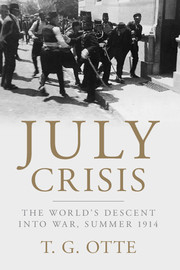Book contents
- Frontmatter
- Dedication
- Contents
- List of illustrations
- List of maps
- Preface and Acknowledgements
- List of abbreviations
- List of the principal dramatis personae
- Europe, 1914
- The Balkans, 1914
- Introduction
- 1 Prelude: the road to Sarajevo
- 2 Sarajevo and its echoes: 28 June to 5 July
- 3 The triumph of tactics over strategy: 6 to 21 July
- 4 Localizing the crisis: 19 to 23 July
- 5 The ultimatum: 23 to 26 July
- 6 Localizing the war: 26 to 28 July
- 7 Escalation: 29 July to 4 August
- Conclusion
- Index
- Plate section
- References
Introduction
Published online by Cambridge University Press: 05 July 2014
- Frontmatter
- Dedication
- Contents
- List of illustrations
- List of maps
- Preface and Acknowledgements
- List of abbreviations
- List of the principal dramatis personae
- Europe, 1914
- The Balkans, 1914
- Introduction
- 1 Prelude: the road to Sarajevo
- 2 Sarajevo and its echoes: 28 June to 5 July
- 3 The triumph of tactics over strategy: 6 to 21 July
- 4 Localizing the crisis: 19 to 23 July
- 5 The ultimatum: 23 to 26 July
- 6 Localizing the war: 26 to 28 July
- 7 Escalation: 29 July to 4 August
- Conclusion
- Index
- Plate section
- References
Summary
Do not despise the diplomatic documents.
GILBERT MURRAY (1915)It appears to me to be from its very nature an impossibility even to determine from documentary evidence the question of who was responsible for the outbreak of the war.
VICTOR NAUMANN (1919)At the end of June 1914, the young Oxford historian E. L. Woodward was spending part of his summer vacation at a resort in the Black Forest. In the late afternoon of Sunday, 28 June, the polite tinkling of cosmopolitan teacups on the long terrace of the Badenweiler spa hotel was interrupted by some startling news: the Archduke Franz Ferdinand, heir to the Habsburg throne and future ruler of some forty-five million people in central and south-eastern Europe, had been assassinated in Sarajevo. The hotel crowd excitedly dispersed to form separate groups according to nationality: ‘I knew that something very grave had happened’, Woodward reflected many decades later. Something grave had indeed happened, though Woodward was perhaps reading back into the past a fancy of foresight.
When viewed at the distance of a century, there is a paradox about 1914: it should have been an unremarkable year. After years of turmoil, especially in south-eastern Europe, the short-term indicators pointed towards peace. European diplomats spoke of a new era of détente. But the two recent Balkan conflicts in 1912 and 1913 had left unexploded ordnance in their wake, one being Albania, now independent but without agreed frontiers. Under the rule of a German princeling, the Prince of Wied, the country was on the verge of becoming a failed state: ‘les caisses sont vides, le thrône est Wied, tout est vide [the coffers are empty, [on] the throne is Wied, everything is empty]’, as some unkindly soul put it in the spring of 1914. But whilst there were problems in the periphery of Europe, relations between the Great Powers appeared relatively free of friction, especially when compared with previous years. To explain how and why the Powers found themselves in a world war, then, poses a significant challenge to the student of the past.
- Type
- Chapter
- Information
- July CrisisThe World's Descent into War, Summer 1914, pp. 1 - 8Publisher: Cambridge University PressPrint publication year: 2014
References
- 1
- Cited by



